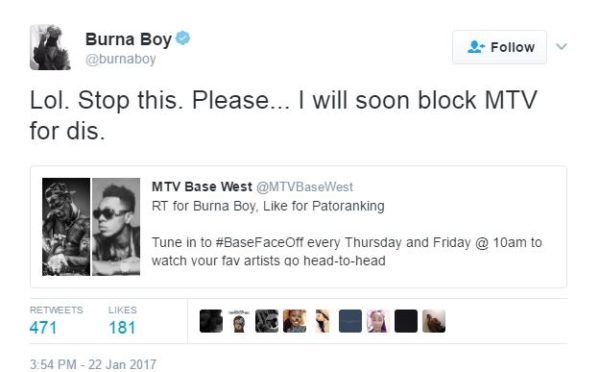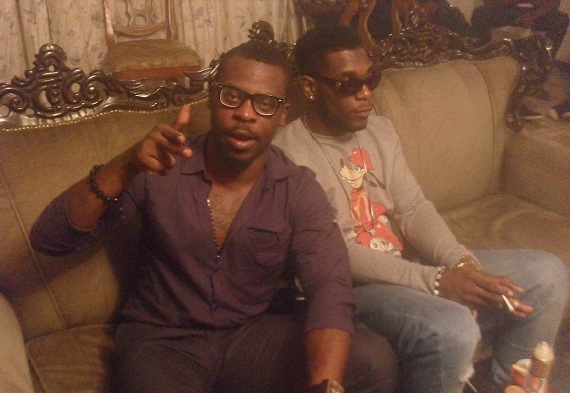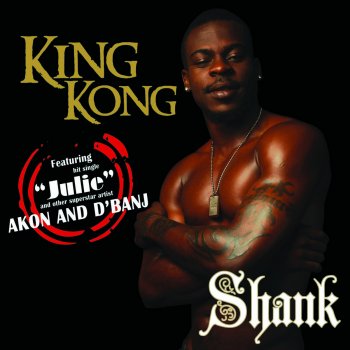Burna Boy is a special type of beast, one-of-one on the microphone, a maverick of a songwriter and easily one of the most naturally gifted singers of his generation. Burna has a confidence in his ability that borders on dickishness at times but hate him or loathe him, you can never deny that Burna Boy is always 1,000% percent himself.
Burna calls his music “Afro-Fusion” because he incorporates hip-hop, R&B and Afrobeat into the mix that LeriQ first helped concoct. But to the rest of the country who consider any music sung in patois and delivered over a dance beat to be dancehall, Burna Boy is a dancehall act. End of.
Ostensibly, dancehall and reggae music are lumped together in the same family in this country, so it is fairly normal for Burna to be compared with singers that are seen as his contemporaries in the genre. But Oluwa Burna is having none of that. The singer recently made this known when he responded to a tweet from the MTV Base account asking for their followers to choose between him and Patoranking.

The singer also made interesting allegations that some of his peers were following him on social media just to steal his melodies. After making such bold claims and showing his disdain for being compared to anyone, I couldn’t help but wonder if Burna had ever looked in the mirror before and realized that the rest of Nigeria had seen an artist with an image that looked just like his.
Shank was the original dark-skinned, tatted up, dancehall bad boy. When he first came out, Burna Boy had a dark and frightening past that he left behind in the UK but when he first came out, Shank’s name alone sounded dangerous. He too was influenced by Western music and culture just like Burna, those influences reflect in the the quality of the music. The similarities in image are worth noting but ultimately what joins Shank and Burna Boy is something deeper and more spiritual. Being that Shank’s father was once a member of Fela’s band (legend has it that Abami Eda himself spotted Shank’s musical talent early on) and Burna Boy’s grandfather was Fela’s one-time manager, both artists share a deep and profound love for Fela Kuti’s music.

Source: PH City Music
Today marks the 8th year anniversary of Shank’s debut album King Kong, an outstanding piece of work that combined dancehall and reggae, sprinkled with a unique Lagos street flavor that sounded like nothing else at the time. Then there were those memorable ad-libs that Shank infused in between. Dear Lord! I still listen to the album at least once every month till this day. “Toast of Town” has been the soundtrack to one too many breakups, “Never Felt” brings back memories from parties in my younger years, while the intro of “Julie”still remains one of the easiest to recognize on a DJ’s playlist.
King Kong also had a stellar line-up that included D’banj and Akon at their respective primes, and when it was a huge deal to get either of them to do a guest feature, and DaGrin before his death the following year. The Ying Yang twins were also supposed to be featured guests on KK but that fell through. The album also featured production from A-listers like Don Jazzy, Sossick, Dr. Frabz and Sarz and those producers gave it a rich, progressive sound. KK was supposed to certify Shank as an artist going places, unfortunately it was to be his last full length project – Shank didn’t go very far.
After KK, Shank had other reasonably popular singles like “Ghetto” and “Salute”, his second album was scheduled for release a couple of years after the first but that project never materialized. There was a reported rift between artist and label in between and the talented singer’s career was in limbo for a while. At the tail-end of 2011, a partnership between Starville, Shank’s label run by Iloya Oyarekua, and Storm Records was not enough to restart the momentum and sadly, Shank’s career has been start-stop since then.
In a move that, in hindsight, looks like a changing of the guard of sorts, Burna Boy did collaborate with Shank on his Burn Identity mixtape on the song “Friend Like Me” – the clearest indication that the similarities between the two didn’t extend to the sounds of their music.
A lot has changed since this mixtape dropped in 2011. Burna Boy is so much bigger than Shank ever was and has elevated the darker, grittier side of reggae/dancehall to heights that Shank probably hoped he could have. The similarities aren’t as visible anymore especially as Shank hasn’t been consistently in our faces in recent years but in thumping his chest and looking down on his peers, Burna Boy need not look very far to see that his position as top dog won’t last forever.


